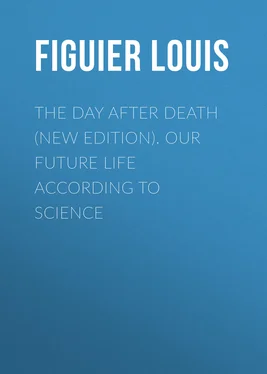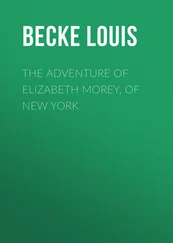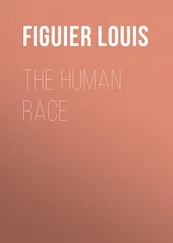Louis Figuier - The Day After Death (New Edition). Our Future Life According to Science
Здесь есть возможность читать онлайн «Louis Figuier - The Day After Death (New Edition). Our Future Life According to Science» — ознакомительный отрывок электронной книги совершенно бесплатно, а после прочтения отрывка купить полную версию. В некоторых случаях можно слушать аудио, скачать через торрент в формате fb2 и присутствует краткое содержание. Жанр: Эзотерика, foreign_religion, foreign_antique, foreign_prose, на английском языке. Описание произведения, (предисловие) а так же отзывы посетителей доступны на портале библиотеки ЛибКат.
- Название:The Day After Death (New Edition). Our Future Life According to Science
- Автор:
- Жанр:
- Год:неизвестен
- ISBN:нет данных
- Рейтинг книги:5 / 5. Голосов: 1
-
Избранное:Добавить в избранное
- Отзывы:
-
Ваша оценка:
- 100
- 1
- 2
- 3
- 4
- 5
The Day After Death (New Edition). Our Future Life According to Science: краткое содержание, описание и аннотация
Предлагаем к чтению аннотацию, описание, краткое содержание или предисловие (зависит от того, что написал сам автор книги «The Day After Death (New Edition). Our Future Life According to Science»). Если вы не нашли необходимую информацию о книге — напишите в комментариях, мы постараемся отыскать её.
The Day After Death (New Edition). Our Future Life According to Science — читать онлайн ознакомительный отрывок
Ниже представлен текст книги, разбитый по страницам. Система сохранения места последней прочитанной страницы, позволяет с удобством читать онлайн бесплатно книгу «The Day After Death (New Edition). Our Future Life According to Science», без необходимости каждый раз заново искать на чём Вы остановились. Поставьте закладку, и сможете в любой момент перейти на страницу, на которой закончили чтение.
Интервал:
Закладка:
We have seen what becomes of a man's body after his death, and also of his life; let us now examine into the condition of his soul.
No philosopher, no learned man, none of those who know the immensity of the universe and the eternity of the ages, can admit that our existence on the earth is a definite thing,—that human life has no link with anything above or beyond itself. Man dies at thirty, or twenty years old; he may live only a few months, or a few minutes. The average length of life, according to Duvilard's tables, is twenty-eight years. At present it is thirty-three. One fourth of mankind die before their seventh year, and one half do not outlive their seventeenth. Those who survive this time enjoy a privilege which is denied to the rest of the human race. 2 2 Rambosson. "The Laws of Life." Paris , 1871. P. 121.
What is so short an interval, compared to the general duration of time, to the age of the earth and of the worlds? It is one minute in eternity. Our brief life is not, cannot be anything but an accident, a rapid and passing phenomenon, which hardly counts for anything in the history of nature.
On the other hand, the physical conditions of terrestrial life are detestable. Man is a martyr, exposed to every sort of suffering: owing partly to the defective organization of his body, incessantly menaced with danger from external causes, dreading the extremes of heat and cold; weak and ailing, coming into the world naked, and without any natural defence against the influence of climate. If, in one portion of Europe, and in America, the progress of civilization has secured comfort for the rich, what are the sufferings of the poor in those very same countries? Life is perpetual suffering to the greater number of the men who inhabit the insalubrious regions of Asia, Africa, and Oceania. And then, before there was any civilization at all, during the period of Primitive Man, a period so immense that it stretches back to a hundred thousand years before our epoch, what was the fate of humanity? It was a perpetual succession of suffering, danger, and pain.
The conditions of human existence are as evil from the moral as from the physical point of view. It is granted that here below happiness is impossible. The Holy Scriptures, when they tell us that the earth is a valley of tears, do but render an incontestable truth in a poetic form. Yes, man has no destiny here but suffering. He suffers in his affections, and in his unfulfilled desires, in the aspirations and impulses of his soul, continually thrust back, baffled, beaten down by insurmountable obstacles and resistance. Happiness is a forbidden condition. The few agreeable sensations which we experience, now and then, are expiated by the bitterest grief. We have affections, that we may lose and mourn their dearest objects; we have fathers, mothers, children, that we may see them die.
It is impossible that a state so abnormal can be a definitive condition. Order, harmony, equilibrium reign throughout the physical world, and it must be that the same are to be found again in the moral world. If, on looking around us, we are forced to acknowledge that suffering is the common and constant rule, that injustice and violence dominate, that force triumphs, that victims tremble and die under the iron hand of cruelty and oppression; then it must be that this is only a temporary order of things. It cannot be otherwise than a moment of transition, an intermediary period which Providence condemns us to pass through rapidly, on our way to a better state.
But, what is this new condition, what is this second existence which is to succeed to our terrestrial life? In other words, what becomes of the human soul after death has broken the bonds which held it to the body? This is what we have to investigate.
That being, superior to man in the scale of the living creatures which people the universe, has no name in any language. The angel acknowledged by the Christian religion, and honoured by an especial cultus , is the only approach we have to a realization of the idea. Thus Jean Reynaud calls the superior creature, who is, he believes, to succeed to man after his death, an angel . But we will put aside the word altogether, and call the perfected creature who, in our belief, comes after man in the ascending series of nature, the superhuman being .
CHAPTER THE THIRD
WE have seen that of the three elements which compose the human aggregate , one only, the soul, resists destruction. After the dissolution of the body, after the extinction of the life, the soul, detached from the material bonds which chained it to the earth, goes away, to feel, to love, to conceive, to be free, in a new body, endowed with more powerful faculties than those allotted to humanity. It goes away to compose that which we call the superhuman being. But where does this new creature dwell?
All students of nature know that life is spread over our globe in prodigious proportions. We cannot take a step, our eyes cannot glance around us, without everywhere encountering myriads of living beings. The earth is nothing but a vast reservoir of life. Examine a blade of grass in a field, and you will find it covered with insects, or inferior animals. But your eyes will not suffice for this examination; you must have recourse to the microscope. With the aid of the magnifying glass, you will discover that this blade of grass is the refuge of an active population, which are born, multiply, and die with prodigious rapidity on their almost imperceptible domain.
From this blade of grass you may draw inferences and conclusions respecting the vegetation of the entire globe.
The fresh waters which flow upon the surface of the earth are also the receptacle of a prodigious quantity of organic existence. Without mentioning the plants, and the animals which live in the waters of the rivers and streams, and are visible to the naked eye, if you take a drop of water from a pool, and place it under the microscope, you will see that it is filled with living beings, who, though so small that they escape our unassisted vision, are none the less active, and all hold their appointed place in the economy of nature. We know how thickly peopled with inhabitants is the great drop; but, without speaking of beings visible to all, the fishes, the crustacea, and the zoophytes, or of the marine plants, creatures, invisible except under microscopical examination, abound to such an extent in sea water, that one single drop of it, so examined, displays innumerable quantities of these microscopic animals and plants.
From this drop of water you may draw inferences and conclusions respecting the entire mass of waters which occupy the basins of the seas, and form three-fourths of the surface of our globe.
In order that some conception may be reached of the enormous numbers of the living beings contained in the seas now, and formerly, we may fitly recall in this place a fact well known to geologists. It is, that all building stone, all the calcareous earth of which chalk hills and banks are formed, are entirely composed of the pulverized and agglomerated remains of the shells of mollusca, visible or microscopic, which, in the most remote ages of the existence of the globe, peopled the basin of the seas. The whole of this formation is composed of the accumulation of shells. If life has been lavished with such profusion in the waters during the geological periods, it must be equally lavished now, in almost similar ways, because the actual conditions of nature do not differ from what they were in the primitive ages of the globe.
The air which surrounds us is, like the earth and the seas, a vast receptacle of living creatures. We see only a few animals cleaving the aërial space, but the savant , who looks beyond the simple appearance of things, discovers myriads of existences in the air.
Читать дальшеИнтервал:
Закладка:
Похожие книги на «The Day After Death (New Edition). Our Future Life According to Science»
Представляем Вашему вниманию похожие книги на «The Day After Death (New Edition). Our Future Life According to Science» списком для выбора. Мы отобрали схожую по названию и смыслу литературу в надежде предоставить читателям больше вариантов отыскать новые, интересные, ещё непрочитанные произведения.
Обсуждение, отзывы о книге «The Day After Death (New Edition). Our Future Life According to Science» и просто собственные мнения читателей. Оставьте ваши комментарии, напишите, что Вы думаете о произведении, его смысле или главных героях. Укажите что конкретно понравилось, а что нет, и почему Вы так считаете.












